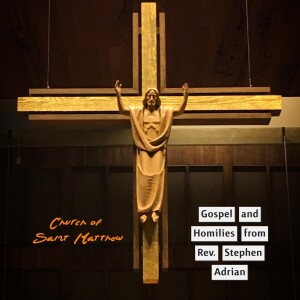
Wednesday Apr 19, 2023
08.15.2020 Homily
The gospel story today is about boundaries and about crossing boundaries. It's about life is not just either/or, life is really both/and. Matthew has a very difficult time in the community that he writes for. His community is located in places we know now as Syria, and the majority of the people in the community were Jews who were converted to Christianity. But a growing minority that was moving into that community were Gentiles who became Christian. And there was a tension between those of Jewish background and those of Gentile, and they found it very difficult to get together.
And so what Matthew tried to do in writing this gospel is, he tried to show to the Jews that Jesus does not reject the faith of Israel. He does not reject the law. He fulfills the law. He brings it to its conclusion. He rounds out what the law truly means. And so they should not be afraid of holding their faith in Jesus. And then he says to the Gentiles: Jesus has a mission out to you. He said to his disciples, "Go to all the world. Tell them everything I have told you. Baptize them in the name of the Father and the Son and the Holy Spirit.” For Jesus this is an inclusive act by which all of creation is drawn together.
Matthew tried to walk that line between those two either/or positions. There is a point in Matthew's gospel, which is a little bit autobiographical. He says, "A true scribe who has been trained in the household of God is like a farmer who knows how to bring what is good, what is new, and what is old out of his storeroom.”
Well, you and I are living in a time when there are lots of boundaries, and there is a lot of binary thinking. Either this is right, or this is right, and there is no middle ground. I mean, we do that with immigration. Either we keep everybody out or we open the doors and let everybody in. And the real question is where do we find the answer to immigration that respects both those who seek entrance and those who are citizens? How do we do that? That's not easy, but it's certainly not going to the extreme.
Or we have tension between the disproportion of wealth between the rich and the poor. And some would say that we should revert to a system where everyone receives, and no one has too much and no one has too little. And there's another extreme that says: listen, I worked hard for this. This is my money. I don't see any reason why I ought to be giving that to someone else.
Well, the problem of the disparity of income is a problem that needs to be solved, but it's not solved by either/or. It's solved by both/and. A border needs to be walked over. A boundary needs to be walked over.
Jesus walked over that border. At that boundary, He came into the story, being a pious Jew. He has said, "I have no business with these people. I was sent only to the children of the house of Israel." And then the woman comes and she pleads with Him. She gets down on her knees and she makes an act of faith. And what does she do? She changes Jesus. He changes His heart. He looks upon her lovingly and He says, "Woman, you have great faith. Let it be done as you wish." Jesus crossed that boundary.
He does that in so many ways in the gospel, He is found with people who are on the fringe, or who are on the outside. He eats with them. He gathers them around Himself. He makes friends with them. And He runs into trouble because He's not observing the cultural differences that are really written right deep into the heart of the Jew. Either you’re an Israelite and a follower of God, or you're not. Either you share the love of God or you're outside. You know, we used to say that same thing. We said, you know, it's only Catholics who can go to heaven.
Well, Jesus tells us that we need to put aside the binary thinking. And if we're going to embrace the gospel, we must have arms wide open and be inclusive. The great racial turmoil that we face in our country, a lot of that is on one side or the other, and there are extremes. And yet it's absolutely necessary that we as a people, independent of race, and independent of culture, and independent of national origin, that we as a people come to see ourselves as one.
Just as Matthew prayed that the Jewish converts and the Gentile converts would be able to come and see themselves as one.
No comments yet. Be the first to say something!